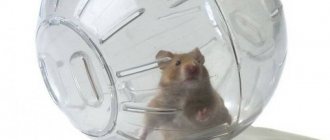Hamsters may still be considered the "standard" pet rodent, but rats have gained many fans over the years. Many rat owners claim that their chosen pet has a lot of advantages - if you don't pay attention to the tail. They're smart, clean and playful, but when it comes to rats versus hamsters, who really wins the battle?
Is it possible to cross a rat and a hamster?
Many people wonder whether it is possible to keep two opposite-sex representatives of the order of rodents in one cage; whether this could result, for example, in a hybrid obtained by crossing a rat and a hamster. Experts unanimously declare that this is almost impossible, since the first individual is distinguished by bloodthirstiness, an inquisitive mind and increased competitiveness. There are often cases when animals living in neighboring cages tried to harm each other, even in the presence of metal bars separating them.
How to distinguish a hamster from a decorative mouse
Many people wonder how to distinguish a representative of the hamster family from mice. It's pretty simple. It is enough to pay attention to such characteristics as:
- size – hamsters are usually larger than decorative mice;
- the presence of a cheek pouch in hamster breeds, its absence in mouse breeds;
- the presence of a thin, long tail in mice;
- fur color - in hamsters it can be multi-colored, black, white, gray, but in mice it can only be white or gray.
Comparing which pet is more active is pointless for the reason that everything depends on their habitat. Basically, both of these animals love various accessories designed to train strength and endurance, so they must be present in the cage.
Pros and cons of keeping hamsters and rats
When trying to understand who is better, a rat or a hamster, you should first think about your tastes. In addition, both families from the order of rodents have positive and negative aspects in their content. Figuring out who is better, a hamster or other rodents, is not that difficult.
Individuals of the hamster family
The advantages of keeping individuals of the hamster family are:
- simplicity and ease of care;
- saving money on organizing living space and food;
- the tendency of animals to be lonely, because even in the wild they live together only for the mating period;
- no need for a large and tall cage.
The disadvantages of keeping a hamster are:
- inability to learn tricks, they cannot be trained;
- increased drowsiness of animals;
- increased activity at night, which interferes with normal human sleep;
- lack of attachment to owners;
- short lifespan.
When choosing between a hamster and a rat, it is worth thinking about why the animal will be purchased. If, as a fluffy “toy” for a child, it is most likely better to give preference to an unpretentious hamster, but if for full communication between the owner and the pet, the choice should be made on representatives of the mouse family.
Members of the mouse family
When choosing a hamster or a rat, you should pay attention to the strengths of keeping the latter. These include:
- ability to be picked up;
- daily lifestyle of the animal;
- increased sociability;
- development of attachment to the owner;
- well-developed mind, ability to train;
- long life expectancy.
In addition, it is worth noting that when choosing a hamster or a rat, it may indeed be better to give the primacy to the latter, because, unlike other rodents, it almost never bites its owners. The animal can “show character” if it is very scared, but it will not bite the skin of the human body until it bleeds. However, there are certain disadvantages to keeping a pet. These include:
- the possibility of developing frequent inflammatory processes and cancer;
- significant financial expenses for the purchase of a large, spacious cage and additional accessories;
- the need for increased attention to their “person”;
- mandatory acquisition of another individual of the same sex or several representatives of this family.
When trying to understand which of the representatives of the rodent order is better - a hamster or a rat, you should base it on your own desires. If you need a faithful friend and comrade, preference is given to individuals of the mouse family, but if you need a pet that does not require strong affection and care, it is better to choose individuals of the hamster family.
The nuances of keeping other rodents
Another rodent that is still very rarely kept at home is the mouse. The decorative mouse is the same size as the Djungarian hamster, and is closer in character to a rat. Mice are kept in groups, they are very interesting to watch and easy to care for. The downside is the specific smell of these animals.
decorative mouse
Chinchilla
If the size of your home allows, you can take a closer look at larger animals. The same chinchilla cannot do without a spacious enclosure with several floors. This rodent requires significant financial expenses for purchase and maintenance. A child will not be able to care for a demanding beauty on his own; such an animal is owned by adults.
Chinchillas, like hamsters, make noise at night, do not like to be handled, and are shy. But they have practically no smell. When deciding who is better - a hamster or a chinchilla, remember that the main difference between animals is their life expectancy. A large rodent with a luxurious coat lives for many years: 10-15 years with good care.
chinchilla
Decorative rabbits
Decorative rabbits live not much less than a chinchilla, about 8-12 years. They are peaceful and bite only in exceptional situations. But even with sufficient cage sizes (at least 100x60 cm), they need to be let out for a walk. In an apartment, this threatens property damage and marks if the pet is a male. Rabbits have fragile health and need to be vaccinated and not stressed. If you have a choice: a rabbit or a hamster, the decision is made depending on the living space and financial capabilities.
decorative rabbit
Guinea pigs
If your child doesn’t want to adopt an individualistic hamster, you should pay attention to guinea pigs. They are lighter than a chinchilla or a rabbit, they make contact, and are easily tamed. Herd animals get bored when alone. Among the minuses, it is worth noting the noise at night and the smell from the cage; pigs are not as clean as hamsters. And the guinea pigs themselves are far from quiet. They whistle and chirp deafeningly, begging for food or demanding attention.
Guinea pigs
Who to choose - a hamster or a mouse?
Having tried to independently distinguish a hamster from a mouse in a pet store, many then wonder who is better - a hamster or a mouse. Some experts believe that the battle “hamster versus other rodents” is unequal, since the latter are much smarter and more sociable. However, if a person needs a decorative pet “for furniture,” naturally, he needs to purchase an individual from the hamster family.
When buying a decorative mouse, it is worth remembering how to distinguish a hamster from a mouse. It is also important to ensure that it does not exist alone within the cell. Several individuals, preferably same-sex, will get along well together. If you compare a hamster against rodents such as rats and mice, then, naturally, the latter do not win. Khomkis are loners by nature, the desire for “dominance” over the territory where they are located is an instinct that allows them to survive.
Who better to have at home
To choose the right pet, it is recommended to consider not only the pros and cons of animals. You also need to think about what is best for the owner. If you need a smart, affectionate and sociable friend, get a rat. For those who like to watch the funny fuss of furry babies, a hamster is suitable.
In any case, soon the small animals will become part of the family, and their shortcomings will fade into the background.
All of the above pros and cons are conditional and are, rather, part of a subjective assessment. In fact, it is impossible to say exactly which animal is better. You can only determine who is more suitable by character.
Appearance of rodents
There is no denying the fact that hamsters are beautiful to look at. Their rounded bodies and miniature faces, combined with a fur coat, create a very attractive appearance.
To their fans, the rats are just as beautiful and come in almost as many colors as the traditional Syrian hamster. The two most common external characteristics of rats that intimidate their potential owners are their hairless tail and large body proportions. But it is important to remember that the rat's tail has a very important purpose.
The rat's tail is incredibly effective for balance, which in turn makes pet rats much more acrobatic than hamsters. They happily jump and climb around the cage, where the hamster constantly trips.
Outside their cage they are just as well balanced and will happily climb around your room, and they can also crawl on your body without any problem. This actually makes rats easier to handle than hamsters as they are much less likely to get into trouble.
Sizes of rat and hamster
In terms of size, rats are certainly larger than hamsters, although their long tails can make them appear much larger than they actually are. They are also more active, which requires a significantly larger cage if you want to keep them happy.
The upside to rats' size is that they are easier to handle and harder to slip through tiny cracks in the cage. Whereas hamsters, due to their small size, can easily get lost in a room after escaping from their cage.
Who is smarter, a rat or a hamster? ? My friend claims that the hamster is smarter but I don’t agree!
in in . I think so too. But my friend stands her ground!
a rat is stronger than a hamster and more cunning, it will take him, no matter how smart he is.
definitely a rat - that’s why experiments are done on them.
Here even a fool understands that the rat is smarter.
rats are smarter. rats are trainable
Rats are smarter) And among rats, females are smarter than males)
Of course it's a rat! The rat is the smartest animal.
This is not for everyone. Some people like hamsters more simply morphologically, and they look “cute” and create the impression of “smart cuties,” but in reality, of course, the rat is smarter. This is a very cunning, agile and easy to train animal. Rat.
The rat is an intelligent and loyal animal. She recognizes her owner and can be trained.
your friend is like a hamster herself
Rat definitely, there are studies that they are the only ones who will survive even a nuclear strike
but the hamster has a wider mug and a bigger butt
Hey, girls, don't quarrel, the rabbit is smarter)))))
Of course, rats are smarter... I just could never understand why a person needs a rat? Hamsters are adorable precisely because of their stupidity... such hilarious seriousness and thriftiness, well, they just draw you into the state of “Here” and “Now”. She lived in my coconut. Believe it or not, I laughed until I was exhausted when I dropped spaghetti on the floor and threw it to my Mouse... how she tried to pack this stuff into her cheek pouch to include it as her supplies... it was incredible. There are more than a hundred seeds, it looks funny... and what happened when one day I fell on a bag of seeds... And they left for the dacha - she ran away - sweet, tame from birth! For almost a week she led the free life of a wild animal, hid, rustled, found a box with bell peppers, and that’s all she ate, the poor fellow... And only when I was completely hungry did I give up. She just stood up like a lonely column and watched until I took her in my arms. It’s also great - if the hamster is young, like a kitten, you can teach him to go to the litter box. It's a pity, their life is very short.
Smarter rat! But, who cares. Some people like hamsters, some like rats!
Definitely rats! Give her the example that rats can quickly find a way out of the most intricate labyrinths. Then the rats flee from the ship that is destined to sink, even before it sails. Rats can develop a friendly attachment to a person, which cannot be said about hamsters.
Source
Pet personalities
If there's one personality trait that most hamster owners can agree on, it's that hamsters can be quite grumpy at times. They are naturally nocturnal and begin to wake up in the evening. If you wake them up early, they will be very unhappy.
Of all the common domestic rodents, hamsters are the ones that bite most often. This is especially true for small species of hamsters - for example, Russian and Chinese. Remember also that hamsters are not only annoying to their owners from time to time - they can be even more rude to members of their own species. For this reason, there is no need to anger the old hamsters, otherwise serious fighting may begin.
Rats in general have a calmer attitude towards both people and other animals. Although their teeth may be larger than those of hamsters, they use them much less frequently. If you don't stick your fingers through the grate where your pet can bite them, thinking it's food, then you're much less likely to be bitten by a rat than by a hamster. For young children this can be a very positive thing.
Comparison of intelligence
There is a very good reason why rats have a high survival rate in the wild - their superior intelligence. Rats are among the most intelligent creatures of their size, capable of quickly solving seemingly complex problems.
For pets, this intelligence can be a good thing. Many pet rats are capable of learning tricks and can also recognize different family members. This can make them very attractive as pets.
The downside to this intelligence is that great care must be taken to ensure proper brain activity for them at all times. Not only should rats get out of their cage regularly to interact with people, but it is also important that they have adequate space and a range of toys to entertain themselves with.
Also note that it is recommended to keep two or more rats together so that they always have company.
Although toys are available for hamsters, they tend to be less interested in them. Sometimes a hamster can use a simple wheel, no matter how much money you have invested in expensive toys.
Bird keeping
Rodents are primarily acquired by those people who do not want to walk their pet. But there is another class of pets that are kept at home in a cage - ornamental birds. The most common are parrots, especially budgies. A parrot is significantly different from a hamster in everyday life.
Benefits of a feathered pet:
- live longer (wavy birds 10-15 years, large parrots much longer);
- smart;
- amenable to training;
- don't smell.
Disadvantages and difficulties of content:
Require communication
If the bird is not given enough attention, it can lead to nervous breakdown and health problems. Demanding communication, the parrot can scream heart-rendingly. Leaving a parrot when going on vacation will be problematic, unlike an independent hamster.
Noisy
The hamster rustles at night and creaks its wheel, but never makes as much noise as parrots. They chatter and chirp since dawn. They shake the cage, ring the bell, and throw all the objects in it.
Increase chaos and destruction
Even the smallest budgie needs to be allowed out of its cage to fly. The curiosity of birds in this case comes at a cost. Birds love to dig into pots of plants, and at the same time tear leaves and stems. They throw books and other objects around, peck at baseboards, peel off wallpaper, disassemble the keyboard button by button, and tear up upholstered furniture. Possessing a developed intellect, the parrot will always look for entertainment. If you do not provide the bird with the opportunity for self-realization, it will quickly wither away.
Dirt
Hamsters and most rodents in general are very clean. Parrots are real dirty people. They scatter all the food they eat, go to the toilet everywhere, and the droppings often fly out of the cage, even when the pet is sitting inside. The cage must be washed daily.
Fragile health
Caring for a hamster is not difficult, just don’t break the basic rules. Even children can cope with this. Parrots are demanding of their living conditions and can get sick from a regular draft.
The good news is that if you can't decide whether a hamster or a parrot is better, you don't have to make a choice. You can have both pets, they will not overlap or threaten each other's well-being. During the day, teach the parrot to talk and perform tricks, and in the evening to play with the hamster.
Advantages and disadvantages of rats
There are many reasons why rats make great pets, here are a few:
- More social
: Rats are incredibly social creatures that need a lot of attention. It is recommended to keep them in pairs and they will often play with their cage mates. They are also very friendly with their owners, enjoying cuddles and shoulder walks. - High Intelligence:
Rats are the most intelligent rodents and are commonly used in psychological research. For pet owners, this means that they are easy to train (potty train and teach tricks) and easily form bonds with their owners. - Stay awake longer during the day
: Rats, like most rodents, are technically nocturnal, however pet rats tend to adapt easily to their owners' wake/sleep patterns compared to hamsters, which are not as adaptable. - Less likely to bite:
Contrary to popular belief, rats are very gentle creatures and tend to bite only when they are very scared. Accidental bites are common in all rodents, but bleeding bites are incredibly rare when it comes to rats. - Easy to Handle
: They are larger and weigh on average 4 times more than hamsters, making them much easier to look after.
Decorative rats
Since ancient times, rats have lived alongside people. They spoiled grain supplies, stole birds' eggs, accompanied sailors, and spread diseases. Most people treat these rodents with caution and some disgust. But decorative rats are so different from their pasyukov ancestors that they have turned into pets.
Before you get a decorative rat at home, you should evaluate in advance all the pros and cons of keeping such an animal.
pros
This rodent has many advantages:
- They are very smart, recognize their owners, respond to their name, and are trainable.
- Rats willingly make contact with a person they know well, sit calmly on your arms, climb onto your shoulders, or into your pockets. They are not aggressive, they bite only when very frightened.
- They are nocturnal, but can adapt to family routines and sleep near people.
- Rats do not require special care; they themselves ensure the cleanliness of their fur coat and smooth tail.
- The variety of colors and types of wool is another plus.
Important! Taming rats should begin within a few days of acquisition. You can’t rush and punish for failures. Rewarding with a treat significantly speeds up the process. Experts advise getting a couple of rats of the same sex at once.
Minuses
Before bringing a decorative rat into your home, it is much more important to become familiar with the disadvantages than the advantages:
- The main disadvantage is the short life of a rat. An intelligent and sociable pet ages quickly. Even with the best care, a rat will not live longer than 2.5–3.5 years. Oncology often occurs in these rodents.
- Rats mark territory. They are difficult to litter train.
- Requires constant cleaning of the cage. This will get rid of the unpleasant odor. You need to regularly change the filler, wash the cage, food bowls, toys, wash the hammock, and remove leftover food.
- Rats need a high and spacious cage, preferably multi-level. And such a house takes up a lot of space in the apartment.
- Pets can make noise at night: rustling paper, digging in the filler. This is a big minus for light sleepers.
- Domestic rats chew everything around them - furniture, shoes, books, wires, curtains. Owners should remove documents, gadgets, close bookshelves and wardrobes. There is no point in punishing a pet for a damaged item.
Pros and cons of hamsters
Hamsters have the following advantages:
- They are easy to care for:
Hamsters are relatively easy to keep. They do not need as frequent cleaning as rats and do not require attention. - Cheap to keep
: Hamsters have a lower initial cost than rats because they are smaller and don't need as large cages. Their food is also more accessible and cheaper. - You can only keep one hamster:
the hamster is a solitary creature that prefers its own company. - Doesn't require much space
: Hamsters can live happily in much smaller cages than a rat would require.
- Less Intelligent
: Hamsters are not as intelligent as rats and, as a result, are less affectionate and interactive pets. They are also more difficult to train. - Sleep a lot:
Like rats, hamsters sleep during the day. However, hamsters are more difficult to train to their owners' schedules and may become grumpy and bite when they wake up. - Noisy at night
: Due to the fact that hamsters are nocturnal, they can be very noisy at night, running around on wheels, etc. - Not as Affectionate
: While all pets form bonds with their owners over time, hamsters lack the intelligence equivalent to rats and are therefore less affectionate and loving.











